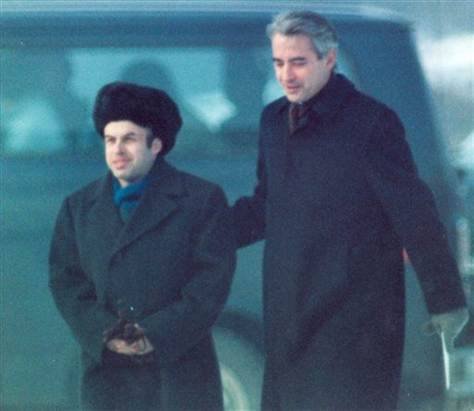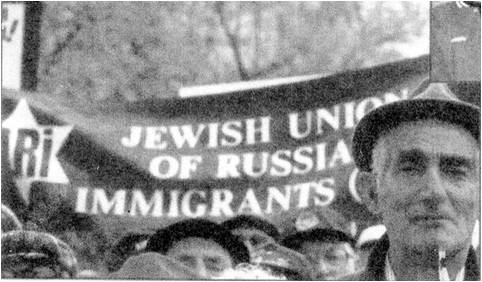From a very young age, Natan was a chess prodigy. Growing up in the USSR, he won prize after prize for his chess skills. He would constantly compete, and constantly win. It has been said, that in order to keep his mind busy during those horrific nine years, Natan would play chess against himself. This was in order to keep his brain engaged. After being released from prison and arriving in Israel, Sharansky continued to compete for fun. He even was part of a competition in Israel where he beat one of the top world-ranked players.
Natan Sharansky- by Bella
Tuesday, December 9, 2014
Part E- Resources, Bibliography, and Interesting Facts
- Check out Mr. Sharansky's Twitter Page: https://twitter.com/natansharansky
- Famous Quotes by Mr. Sharanksy http://www.brainyquote.com/quotes/authors/n/natan_sharansky.html
- What is the Jewish Agency for Israel, which Sharansky is now the Chairman of? http://www.jewishvirtuallibrary.org/jsource/Orgs/jafi.html
- Read about the Israeli political party that was founded by Natan Sharansky, aimed at helping the immigrants of the Soviet Union, in Israel. http://www.jewishvirtuallibrary.org/jsource/Politics/Yisraelbaaliya.html
Bibliography:
Part C- Describing Two Majorly Important Events
EVENT #1 - Sharansky is released after being in a Siberian Labor Camp for nine years.
As a result of the enormous international campaign led by his wife Avital, and increasing international pressure, Sharansky was released from the Siberian prison. He was brought to East Germany, and crossed the Glienicke Bridge (a bridge that crossed a river in Germany) to West Germany where he was met by his wife and family. He was exchanged for two Soviet spies. Sharansky was known for his defiance in the prison cells, so upon crossing the bridge, he was ordered to walk in a straight line towards his freedom. As a final act of defiance, Sharansky walked zigzagged across the bridge. He then moved to Israel, adopted the name Natan, and received the Congressional Medal of Honor.
See an article about Sharansky's release here.
This piece briefly describes some of the struggles and triumphs Sharansky faced upon immigrating to Israel. He came from the Soviet Union where his brilliance in the game of chess made him a prodigy in his home country. But he later arrived in Israel where the national sport was dancing on the beach in a much more laid back manner. This was a lot of adjustment! On the other hand, the Jews at the time of Sharansky's release were bonded together from the four corners of the earth by common desire to save the Jewish Soviets. Jews from America, Europe, Israel, and more came together in support of Sharansky's release and the work he continued to save our brethren.
EVENT #2 - Sharansky becomes Chairman of the Jewish Agency for Israel.
In 2009, Sharansky becomes Chairman of the Jewish Agency for Israel. Among the many policies that he has created, he feels strongly about integrating immigrants into Israeli society. This article explains a very recent example of a conversion reform bill that Sharansky is lobbying to pass in the Knesset. This bill will make it easier for immigrants to convert, and thus, living easier and less impoverished lives in Israel.
As a result of the enormous international campaign led by his wife Avital, and increasing international pressure, Sharansky was released from the Siberian prison. He was brought to East Germany, and crossed the Glienicke Bridge (a bridge that crossed a river in Germany) to West Germany where he was met by his wife and family. He was exchanged for two Soviet spies. Sharansky was known for his defiance in the prison cells, so upon crossing the bridge, he was ordered to walk in a straight line towards his freedom. As a final act of defiance, Sharansky walked zigzagged across the bridge. He then moved to Israel, adopted the name Natan, and received the Congressional Medal of Honor.
See an article about Sharansky's release here.
This piece briefly describes some of the struggles and triumphs Sharansky faced upon immigrating to Israel. He came from the Soviet Union where his brilliance in the game of chess made him a prodigy in his home country. But he later arrived in Israel where the national sport was dancing on the beach in a much more laid back manner. This was a lot of adjustment! On the other hand, the Jews at the time of Sharansky's release were bonded together from the four corners of the earth by common desire to save the Jewish Soviets. Jews from America, Europe, Israel, and more came together in support of Sharansky's release and the work he continued to save our brethren.
EVENT #2 - Sharansky becomes Chairman of the Jewish Agency for Israel.
In 2009, Sharansky becomes Chairman of the Jewish Agency for Israel. Among the many policies that he has created, he feels strongly about integrating immigrants into Israeli society. This article explains a very recent example of a conversion reform bill that Sharansky is lobbying to pass in the Knesset. This bill will make it easier for immigrants to convert, and thus, living easier and less impoverished lives in Israel.
Part A - Biography
Natan Sharanksy was born in Donetsk, Soviet Union, on January 20, 1948. He graduated from the Moscow Institute of Physics and Technology with a degree in applied mathematics. In 1973, Sharansky applied and was denied an exit visa from the Soviet Union to Israel. The government said that they had denied his visa because he had been given access, at some point in his career, to information from the Soviet national security and could not now be allowed to leave the country. After that, Sharansky became a human rights activist, continued his Zionist beliefs, and became one of the founders of the Refusenik movement. (Refuseniks were a group of Soviet Jews denied the right to immigrate abroad.)
Who was he?
Natan Sharanksy is married to Avital Shteiglitz. They met in autum of 1973, at a zionist demonstration in front of a Moscow synagogue. The couple was married on July 4, 1974 in the Moscow synagogue in a ceremony not recognized by the government. This is because the USSR only recognized civil marriage and not religious marriage. The night after their marriage, Avital was given permission to go to Israel, but not Natan. She agreed to stay in Russia and wait until he was permitted to leave. Unfortunately, just months later, he was convicted of many crimes, including treason, and other various crimes he did not commit. Sharansky was sentenced to 13 years of solitary confinement. Avital then began a worldwide campaign to free her husband. Watch their story here:
The story of Avital and Natan
Sharansky was released from prison on February 11, 1986. From there he immediately moved to Israel to be with Avital. In 1995, he co-founded the "Yisrael BaAliyah" political party which emphasized the absorption of Soviet immigrants into Israel society. They won their first knesset seats in 1996. In March 2003, his party joined with the Likud party, and he was appointed Minister of Jerusalem Affairs. Sharansky continued to serve in many ministral positions, but resigning in 2005 to protest the unilateral disengagment from Aza. He was reelected to the knesset in 2006 by a fellow Likud member.
In June 2009, Sharansky was elected to the Chair of the Executive of the Jewish Agency for Israel. Sharansky has written three books, aired on a historical TV documentary, and appeared as guest speakers to many conventions. He is a well-respected leader of our time.
Sharansky and the Jewish Agency
http://en.wikipedia.org/wiki/Refusenik
http://en.wikipedia.org/wiki/Natan_Sharansky
Part B- Timeline
 |
| 1948- January 20- Sharansky is born in Donetsk, Soviet Union |
 |
| 1973- Sharansky meet his future wife, Avital, and a demonstration near the Moscow Synagogue. He is then denied a visa to immigrate to Israel. Sharansky then becomes a social rights activist and one of the founding members of the Refuseniks, |
| 1977- Sharansky is arrested and later convicted of treason and spying for the US. He is imprisoned for 13 years of forced labor. |
 |
| 1996-2006 Sharansky works in various ministry positions and serves on the Knesset. |
2009- Sharansky becomes the chairman of the Jewish Agency
Subscribe to:
Posts (Atom)




